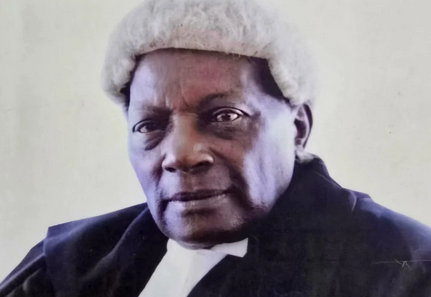The sun has set on a colossus. A mind so formidable, a voice so reasoned, and a conscience so unyielding to the whims of mediocrity and compromise has taken its final earthly rest. The Honourable Professor George Wilson Kanyeihamba, Supreme Court Justice Emeritus, scholar par excellence, fierce defender of constitutionalism, and walking encyclopedia of Ugandan legal and political history, has joined the ancestors. But not as one who is forgotten, rather, as one who becomes immortal through ink, judgment, scholarship, and truth.
Born on 11 August 1939 in Kinaba, Rubanda District (then Kabale, Kigezi Region) as the eleventh child of Zakaliya Bafwokworora and Kyenda Malyamu Kyakundwa, his early years were grounded in rural roots. Educated first at Hamurwa Church School, then Nyaruhanga and Nyakatare Church schools, he proceeded to Kigezi High School and Busoga College Mwiri. A Commonwealth Scholarship later took him across the seas, first to Norwich City College, then to Portsmouth University (now the University of Portsmouth), where he earned his law degree. In the 1970s, he completed his PhD at the University of Warwick; in 2008, Warwick further recognized his extraordinary contributions with an honorary LLD.
On returning to the field of education, Kanyeihamba’s professional chapter began with lecturing at what is now the University of Portsmouth, then as State Attorney in Uganda, tasked with teaching aspiring lawyers at the Law Development Centre (formerly Nsamizi Law School). His rich academic trajectory continued at Lanchester Polytechnic (now Coventry University) and the University of Wales, Cardiff, as a distinguished law lecturer.
In 1975, he published Constitutional Law and Government in Uganda, a nearly 500-page compendium on constitutional and administrative law in Uganda, the East African community, and the Commonwealth. His prolific writing spanned incisive journal articles, from “Legalism and Politics in East Africa” (1973) to “Improving the Standards of Human Rights and Refugee Protection in Africa” (1987), to books like Reflections on the Muslim Leadership Question in Uganda (1998), Kanyeihamba’s Commentaries on Law, Politics and Governance (2006), Constitutional and Political History of Uganda: From 1894 to the Present (2010), The Blessings and Joy of Being Who You Are (2012), and Evolution of Constitutional Law, Public Law and Government (2021). Each text bore the hallmarks of provocation, awakening, reform—writing, not to impress, but to confront and transform.
Kanyeihamba’s statecraft was as polished as his penmanship. He served as Attorney General, Minister of Justice, and Minister of Commerce, always steering with principle. As chair of the Constitutional Committee of the Constituent Assembly, his fingerprints are etched on the 1995 Constitution, named by many as “his greatest legislative child”. Elevated to the Supreme Court in 1997 and retiring in 2009, he emerged as a steadfast bulwark for judicial autonomy, most famously in Besigye v. Museveni (2006), his lone dissent aptly described as a judicial thunderclap. He adopted doctrines such as the Political Question doctrine (as seen in Uganda v. Commissioner of Prisons, Ex Parte Matovu), advocating that courts must, on occasion, refrain from encroaching upon executive matters. In 2005, he courageously condemned the military invasion of High Court premises, warning of a growing trend of executive impunity.
His influence extended beyond Uganda. He served as a judge of the African Court on Human and Peoples’ Rights, adviser to the International Commission of Jurists, and consultant for the Commonwealth Secretariat, all underscoring his PanAfrican stature.
Academically, he was Chancellor of Kampala International University (from 2003) and Kabale University (from 2006), inaugurating their first graduations and becoming a guiding light for institutional academic excellence.
On the personal front, he was a devoted husband to Susan (née Randall) and father to Sarah, Joel, Ruth, and adopted daughter Betty. In 2024, he co-founded the Kanyeihamba Foundation to promote education, transparency, and ethical leadership, a fitting capstone to a life shaped by intellectual activism.
To trace his legacy is to chart the evolution of Uganda’s legal consciousness: a jurisprudent who taught in classrooms and courtrooms, who drafted constitutions and dissented with courage, who analysed governance with scholarly rigour and demanded accountability from power.
The final gavel has fallen. But the echoes of Prof. Kanyeihamba’s jurisprudential thunder, his judgments, his books, his moral clarity- will reverberate through legal thought and civic action for centuries. May future judges read his dissents; may law students cite his texts; may institutions emulate his integrity. For he did not merely live, he argued, challenged, and transcended. Repose in power, learned counsel. Your case has been magnificently argued and eternally won.
Authored by;
Atwemerireho Alex.
Lawyer, Researcher and Governance Analyst.
alexatweme@gmail.com
